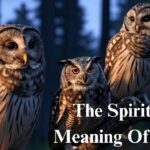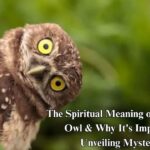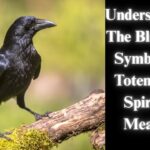Have you ever spotted a crow perched ominously on your fence and felt a chill run down your spine? These dark birds have captivated human imagination for centuries. In biblical contexts, crows and ravens carry deep spiritual significance that might surprise you.
The Bible mentions these black birds multiple times, often as harbingers of important messages. While modern culture might view crows as simply intelligent birds, ancient biblical texts reveal a much more complex symbolism.
Let’s explore the mysterious meaning of crows in Scripture and discover why these creatures continue to fascinate us thousands of years later.
Meaning of Crows in the Bible
In biblical texts, crows and ravens appear in significant moments. These intelligent birds carry multiple layers of meaning. The dark feathers of the crow often represent mystery and the unknown in Scripture.
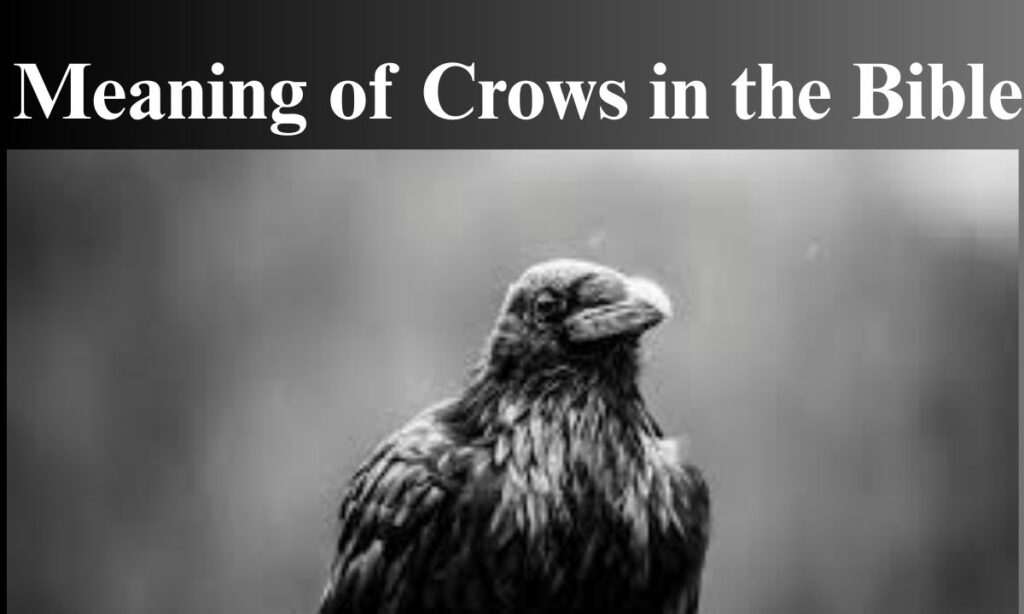
Ancient Hebrews viewed these birds with both fear and respect. The Hebrew word for crow, “oreb,” connects to darkness and mystery. This biblical association shapes how we understand these creatures today.
Crows appear in contexts of both judgment and provision throughout the Bible. Their presence signals important spiritual messages that believers should heed. Let’s explore the various meanings these birds hold in sacred texts.
1. Associated with Impurity (Leviticus 11:15, Deuteronomy 14:14)
In Jewish law, crows were classified as unclean birds. The Bible explicitly states this in Leviticus 11:15: “Of the birds, these you shall detest: they shall not be eaten… the crow in its kinds.”
Deuteronomy 14:14 reinforces this biblical prohibition. The text places crows among birds that should not be consumed. This classification carries important spiritual significance.
Significance
The impurity associated with crows stems from their scavenging nature. These birds often feed on dead creatures and waste. Their diet made them ritually unclean in ancient Hebrew culture.
This designation separated the pure from the impure in daily life. God established these distinctions to teach Israel about holiness. The crow’s status as unclean reinforced the boundary between sacred and profane.
By marking creatures like the crow as unclean, Scripture taught believers to make careful distinctions. This classification system went beyond mere dietary rules. It established a symbolic framework for understanding spiritual realities.
2. Crows as a Symbol of Judgment – Zephaniah 2:14
The prophet Zephaniah uses crows to paint a picture of desolation. He writes: “A flock of wild birds will roost on top of the columns; owls will hoot in the windows, and crows will caw on the doorsteps.”
This vivid imagery appears in a prophecy against Nineveh. The presence of crows signals abandonment and divine judgment. Their cawing echoes through a once-thriving city.
Significance
Crows in this biblical passage represent God’s judgment on rebellion. When these birds inhabit a city, it suggests human absence. Their presence marks the aftermath of divine punishment.
The prophet uses crow symbolism to show the consequences of opposing God. Once-magnificent buildings become mere perches for scavenging birds. This powerful image would have resonated with ancient listeners.
This prophecy reminds us that rebellion against God leads to emptiness. The crows don’t cause destruction – they simply occupy its aftermath. Their presence serves as a warning to those who might follow Nineveh’s path.
3. A Lesson on Trusting God
Jesus himself references ravens (close relatives of crows) in His teachings. In Luke 12:24, He says: “Look at the crows: they don’t plant seeds or gather a harvest; they don’t have storerooms or barns; God feeds them!”
This passage uses crow behavior to illustrate divine provision. Despite their status as unclean birds, God cares for their needs. This demonstrates God’s comprehensive care for creation.
Significance
Jesus uses crows to teach a profound lesson about trust. If God provides for these birds, how much more will He care for people? This teaching challenges anxiety and worry.
The crow’s carefree existence becomes an object lesson. By pointing to these birds, Jesus invites listeners to reconsider their priorities. Trust in God’s provision should replace constant striving.
This teaching transforms how we view these biblical birds. Rather than just symbols of judgment or impurity, they become reminders of God’s faithfulness. Their survival testifies to divine care.
4. Ravens as God’s Messengers of Provision
One of the most striking biblical stories involving these birds appears in 1 Kings 17. During a severe drought, God commands ravens to feed the prophet Elijah: “You shall drink from the brook, and I have commanded the ravens to feed you there.”
This unusual divine intervention saved Elijah’s life. The ravens brought bread and meat twice daily. This crow feeding sustained the prophet during a desperate time.
Significance
This story reveals God’s ability to use unexpected sources. Despite being unclean birds, ravens became instruments of divine provision. This challenges our limited perspectives about how God works.
The provision raven Elijah received demonstrates God’s sovereignty. The Creator can command any creature to fulfill His purposes. Even birds normally associated with death became messengers of life.
This account reminds believers that God’s methods often surprise us. When conventional sources fail, the Lord may provide through unexpected channels. The ravens feeding Elijah exemplify this surprising provision.
5. Ravens as a Sign of God’s Care for All Creatures
The Psalmist celebrates God’s comprehensive care in Psalm 147:9: “He gives to the beast its food, and to the young ravens that cry.” This verse acknowledges divine attention to creatures often overlooked.
Young ravens in particular receive mention. Their hungry cries reach divine ears. This presents a picture of God’s detailed care for all creation.
Significance
This passage reveals God’s tender concern for all creatures. Even birds considered unclean receive divine attention. Their needs matter to their Creator.
The mention of “young ravens” suggests particular vulnerability. Parent ravens sometimes leave their young early. Yet God ensures these abandoned nestlings survive.
This biblical truth reminds us that nothing escapes God’s notice. If He attends to crying raven chicks, He certainly notices human struggles. This reinforces faith in divine providence.
6. Ravens as a Symbol of Beauty and Strength
The Song of Solomon uses raven imagery in a surprising way. In describing the beloved, the text states: “His head is like the finest gold; his locks are wavy and black as a raven” (Song of Solomon 5:11).
This reference employs crow characteristics positively. The comparison highlights beauty rather than ominous associations. This demonstrates the flexibility of bird symbolism in Scripture.
Significance
This passage transforms how we view black birds in biblical contexts. Here, the raven’s glossy darkness becomes desirable rather than forbidding. It represents attractiveness and vigor.
The symbolism in this love poem suggests strength and youthfulness. The comparison to a raven’s feathers elevates these birds beyond mere unclean status. They become reference points for admirable qualities.
This positive portrayal reminds us that biblical symbolism contains nuance. The same creature can represent multiple, even contradictory qualities. Context determines whether crow imagery connotes beauty or judgment.
7. Ravens as a Symbol of Desolation
Isaiah’s prophecy against Edom employs ravens to depict abandonment: “But the pelican and the porcupine shall possess it, also the owl and the raven shall dwell in it” (Isaiah 34:11).
This vision portrays a once-thriving region reduced to wilderness. Human habitation gives way to wild creatures. The presence of ravens signals complete desolation.
Significance
Isaiah uses crow symbolism to illustrate God’s judgment against His enemies. The birds don’t cause destruction but occupy its aftermath. Their presence indicates human absence.
The prophet’s imagery would have resonated powerfully with ancient audiences. Everyone understood what it meant when scavengers claimed a city. It signified complete abandonment and ruin.
This prophecy reminds us that rebellion against God leads to emptiness. The raven’s occupation of Edom’s ruins serves as a warning to all nations. Those who oppose divine purposes ultimately face desolation.
8. Vultures as a Symbol of Spiritual Attack
Genesis 15:11 describes Abram’s covenant experience: “And when the vultures came down on the carcasses, Abram drove them away.” These scavenging birds threatened to disrupt a sacred moment.
The vultures represent opposition to God’s covenant promises. Their attempt to consume the sacrificial animals symbolizes spiritual interference. Abram’s vigilance preserved the integrity of this divine encounter.
Significance
This passage reveals how scavenging birds can represent spiritual opposition. The vultures threatened something sacred. Their presence required active resistance.
Abram’s response demonstrates the proper attitude toward spiritual threats. He didn’t passively allow the birds to disrupt God’s work. Instead, he actively drove them away.
This account teaches believers about spiritual vigilance. Like Abram, we must protect sacred commitments from interference. The vultures remind us that opposition often targets our most important spiritual moments.
9. Vultures Represent Hopelessness and Wandering
Job 15:23 uses imagery reminiscent of circling vultures: “He wanders about for bread, saying, ‘Where is it?’ He knows that a day of darkness is ready at his hand.” This bleak picture portrays desperate searching.
Though not directly mentioning birds, this passage evokes the circling of scavengers. It represents the futility of life without divine guidance. Such wandering leads only to darkness.
Significance
This powerful metaphor captures the hopelessness of life without God. Like someone wandering while vultures circle overhead, the wicked face impending doom without realizing it.
The imagery suggests inevitable judgment. Just as birds of death patiently wait for their prey to weaken, divine justice tracks those who reject wisdom. Their end approaches whether they recognize it or not.
This warning encourages readers to seek God while opportunity remains. The circling vultures represent a fate that can still be avoided through repentance. This sobering picture urges immediate spiritual response.
10. Vultures as a Symbol of Hidden Knowledge
Job 28:7 contains an intriguing reference: “That path no bird knows, nor has the falcon’s eye seen it.” This verse contrasts human knowledge with divine wisdom. Even the sharpest-eyed birds miss what God reveals.
Some translations render “falcon” as vulture or other keen-sighted birds. The point remains that even creatures renowned for perception have limitations. Divine wisdom exceeds natural abilities.
Significance
This passage uses bird symbolism to illustrate the limits of natural knowledge. Even the most perceptive creatures cannot discover true wisdom without divine revelation.
The vulture’s famous eyesight becomes a metaphor for worldly understanding. Despite impressive natural abilities, these birds cannot see what matters most. This highlights the necessity of divine disclosure.
This teaching encourages humility in knowledge-seeking. If even the sharp-eyed vulture misses wisdom’s path, how much more must humans depend on revelation? True insight requires more than natural perception.
11. Vultures as a Symbol of Judgment and Dishonor
Psalm 79:2 laments Jerusalem’s destruction: “The dead bodies of Your servants they have given as food for the birds of the heavens, the flesh of Your saints to the beasts of the earth.” This horrific scene depicts the aftermath of conquest.
Scavenging birds consuming human remains represented the ultimate dishonor in ancient Near Eastern culture. Proper burial mattered deeply. To become food for vultures signified complete disgrace.
Significance
This passage uses birds of death to illustrate the depths of tragedy. The psalmist doesn’t simply lament death but its shameful circumstances. The consumption by vultures adds another dimension of horror.
The image communicates God’s people experiencing the very judgment previously reserved for enemies. This role reversal proved especially disturbing. Israel faced the fate they had witnessed befalling others.
This sobering picture warns believers against presuming upon God’s protection. Even covenant people face consequences for rebellion. The circling vultures remind us that divine patience has limits.
What Do Crows Mean Spiritually?
In spiritual contexts, crows carry multiple layers of meaning. Different traditions interpret these intelligent black birds in various ways. Their significance extends beyond biblical contexts into broader spiritual understanding.
Many see crows as messengers between worlds. Their intelligence and adaptability suggest special awareness. Some traditions view them as guardians of ancient wisdom or spiritual secrets.
The crow’s connection to death appears in numerous cultures. Their scavenging nature links them to life’s end. Yet many traditions also see them as symbols of transformation rather than just destruction.
Native American traditions often view crows positively. They represent intelligence and adaptability. Their ability to thrive in various environments symbolizes resilience and resourcefulness.
What Is the Prophetic Meaning of the Crow?
In prophetic contexts, crows often carry special significance. Their appearance in visions or unusual circumstances might signal divine communication. Understanding their meaning requires spiritual discernment.
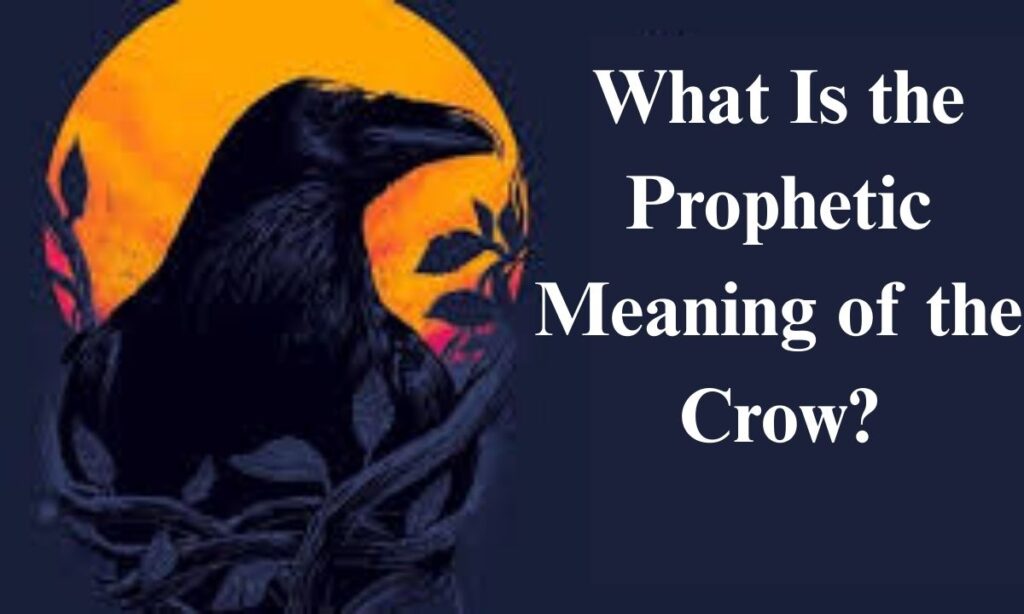
A Warning of Judgment or Destruction
Throughout biblical literature, crows and similar birds often appear in contexts of judgment. When prophets describe devastated cities, these scavengers feature prominently.
Isaiah 34:11 and Zephaniah 2:14 both use crows and similar birds to illustrate desolation. Their presence signals the aftermath of divine punishment. Empty buildings become their perches.
The connection between crows and judgment continues in apocalyptic literature. Revelations describes birds gathering for the aftermath of final battles. Their presence signals the completion of divine verdicts.
Modern prophetic interpretations maintain this association. Unusual crow activity might signal coming difficulties. Their appearance warns believers to prepare spiritually for challenging times.
A Call to Spiritual Awareness
Crows possess remarkable intelligence and perception. They recognize human faces and remember those who threaten them. This awareness parallels spiritual vigilance.
Prophetic traditions view crow encounters as calls to heightened spiritual attention. Their appearance reminds believers to look beyond surface realities. Something important requires discernment.
The biblical account of Abram driving away vultures (Genesis 15:11) reinforces this meaning. Spiritual awareness requires active response. The approaching birds demanded immediate action.
When crows appear in unusually significant ways, they may signal the need for spiritual realignment. Their presence suggests examining life directions and priorities. Something may require attention.
God’s Sovereignty Over Unexpected Sources
The story of Elijah receiving food from ravens (1 Kings 17:4-6) carries profound prophetic significance. It demonstrates God’s ability to provide through unlikely channels.
This account challenges limited expectations about divine methods. The unclean birds became instruments of preservation. This reminds believers that God’s ways often surprise human understanding.
Prophetic interpretations of crow encounters sometimes emphasize this aspect. God may send provision or direction through unexpected sources. Unusual circumstances might contain divine provision.
The raven’s role in feeding Elijah encourages openness to unconventional divine methods. God’s solutions often appear in surprising packages. The prophetic message reminds us not to limit divine options.
A Message of Transformation or Change
Crows undergo remarkable molting processes, emerging with fresh feathers. This physical transformation parallels spiritual renewal. Their cycles symbolize death and rebirth.
In prophetic contexts, crow appearances may signal impending transformation. Something in life requires release to make room for new growth. Their presence encourages embracing necessary changes.
This meaning connects to the crow’s place at transitions. They thrive at boundaries between environments. Their adaptability represents successfully navigating major life shifts.
Prophetic traditions sometimes view crows as heralds of significant transitions. Their unusual appearance or behavior might signal approaching life changes. This warns believers to prepare for new seasons.
What Is the Meaning of Crow in Hebrew?
The Hebrew word for crow or raven is “oreb” (עוֹרֵב). This term appears several times in Scripture. Understanding its linguistic roots enhances our grasp of biblical symbolism.
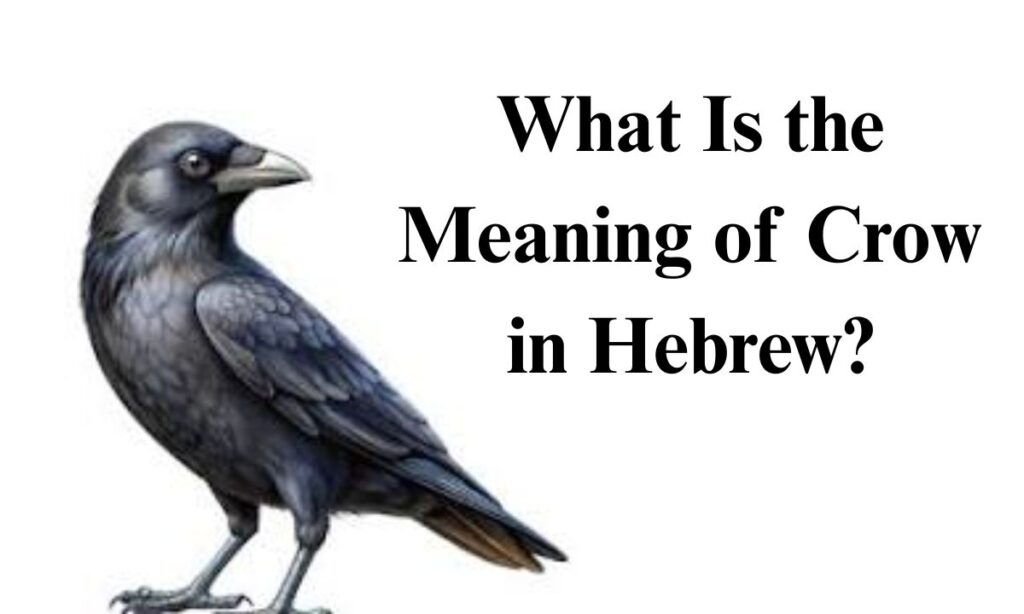
Darkness and Ominous Presence
The Hebrew word “oreb” connects to roots meaning darkness or evening (ערב, “erev”). This etymological link reinforces the crow’s association with mystery and the unknown.
This darkness connection influenced biblical interpretations. Crows represented aspects of existence beyond human comprehension. Their black feathers visually reinforced this association.
The darkness symbolism carried ominous overtones in some contexts. Crows appeared in places humans abandoned. Their presence signaled desolation rather than thriving community.
This linguistic connection between crows and darkness persists in modern Hebrew. It continues to shape cultural perceptions of these intelligent birds throughout the Middle East.
A Symbol of Unclean Creatures
In Hebrew dietary law, crows belonged firmly among unclean birds. Leviticus explicitly prohibits their consumption. This classification shaped how ancient Israelites viewed these creatures.
The designation as unclean carried religious significance beyond mere dietary restriction. It established categories that structured daily life. Clean and unclean established boundaries between sacred and profane.
This Hebrew classification influenced broader cultural perceptions. Crows represented elements outside proper order. Their scavenging habits reinforced associations with death and decay.
Understanding this Hebrew categorization helps modern readers grasp ancient attitudes. The crow’s position as unclean colored every biblical reference. This context shaped how audiences received crow-related imagery.
READ THIS BLOG : Win Amazing Prizes with LookWhat MomFound Giveaway: Enhance Your Family Life Today
A Messenger of God’s Will
Despite their unclean status in Hebrew law, crows sometimes served divine purposes. The story of Elijah receiving food from ravens demonstrates this surprising reality.
This paradoxical role reveals important theological truth. Even creatures deemed impure by ritual standards remain under divine authority. God commands all creation regardless of ceremonial classification.
The Hebrew narratives about crows carrying out divine purposes challenge simplified categories. These birds crossed the boundary between unclean and sacred when serving as divine instruments. This nuanced reality enriches our understanding of biblical symbolism.
Hebrew Scripture presents crows in this multifaceted way. They simultaneously represent impurity and divine service. This complexity teaches believers about God’s sovereignty over all categories and classifications.
Frequently Asked Question
Are crows and ravens the same in the Bible?
While closely related, Scripture sometimes distinguishes between them. Most biblical translations use “raven” for larger corvids and “crow” for smaller ones, though both share similar symbolic meanings.
Did Jesus ever mention crows in His teachings?
Jesus referenced ravens in Luke 12:24, using them as examples of God’s provision. He pointed to how God feeds these birds though they neither sow nor reap, teaching lessons about trust and divine care.
Why were crows considered unclean in the Bible?
Leviticus 11:15 classified crows as unclean because they are scavengers that eat carrion. Their association with death and decay made them ritually impure in Jewish dietary and ceremonial law.
Do crows always represent something negative in Scripture?
No, crows have varied symbolism. While often associated with judgment or desolation, they also represent God’s provision (feeding Elijah) and even beauty (in Song of Solomon comparing hair to a raven’s wing).
What should Christians think when they see crows today?
Christians might view crows as reminders of God’s sovereign care over all creation. Their intelligence and adaptability can prompt reflection on divine wisdom and provision, while also recalling biblical warnings about judgment.
Conclusion
The Bible presents crows, ravens, and vultures as creatures rich with symbolic meaning. From signs of judgment and desolation to surprising instruments of divine provision, these birds carry significant spiritual messages.
Their dark presence in Scripture often signals serious warnings. Cities inhabited by crows instead of people face divine judgment. Their appearance reminds believers that rebellion against God leads to emptiness and ruin.
Yet these same birds demonstrate God’s surprising methods. When ravens fed Elijah during famine, they revealed divine creativity and care. This reminds us that God’s provision often comes through unexpected channels.The spiritual significance of crows extends beyond ancient texts into present experience. Their intelligence and adaptability continue to fascinate observers. Many still sense deeper meaning in their mysterious presence.

jack is an experienced blogger and a passionate wordsmith at Phrase Pioneers. With a keen eye for language and a deep love for writing, she shares insightful posts on grammar, phrases, and the art of communication.


